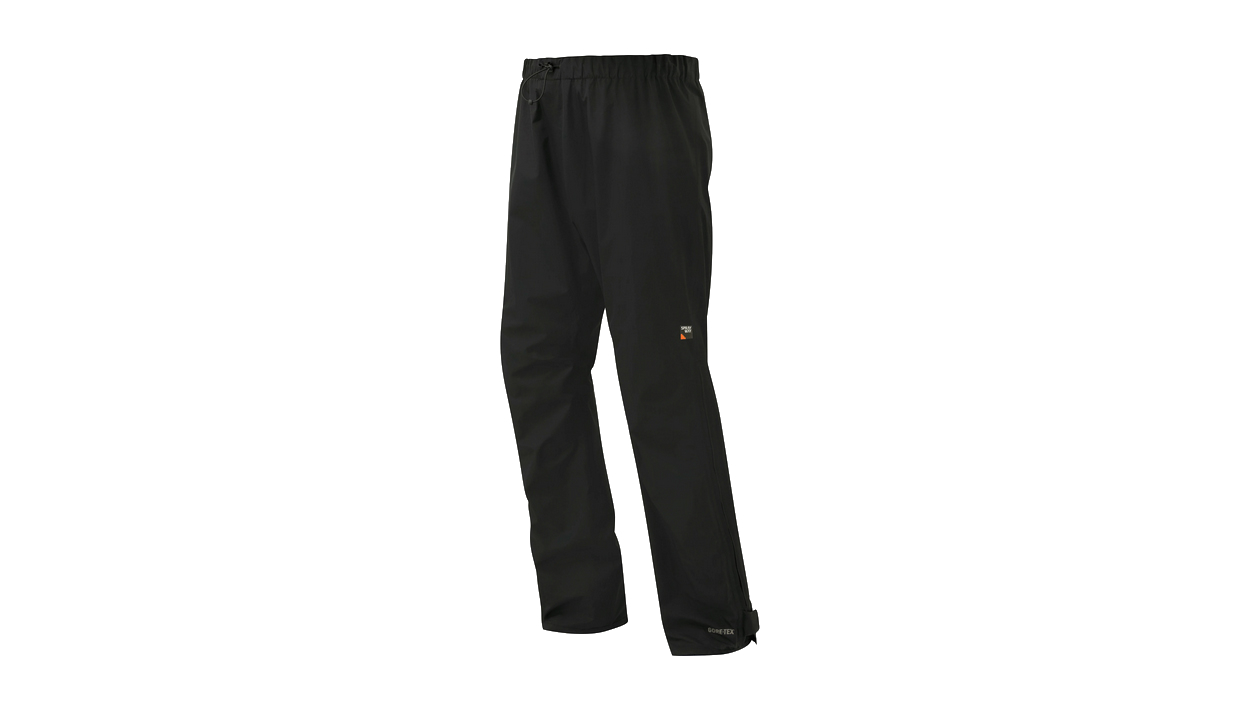Advnture Verdict
The Sprayway Nakuru Rainpants aren’t the most technical bits of legwear, but they do their job well, which means that if the heavens open, they’re easy enough to grab out of a pack and pull on over your boots. Most importantly, they’ll keep you dry and (mostly) comfortable, thanks to a well-proven two-layer Gore-Tex construction that stops the fabric clinging to your legs while moving moisture away effectively.
Pros
- +
Accommodating comfort fit
- +
Reliable waterproofing
- +
Velcro ankle adjustment
Cons
- -
Two-layer construction limits packability
- -
Slightly hot
- -
A little heavy
You can trust Advnture
Sprayway Nakuru Rainpants: first impressions
We’d describe the Sprayway Nakuru Rainpants (the women’s equivalent is called the Berbak) as classic hiking rain pants. Hailing from well-established British outdoor brand Sprayway, they use a two-layer construction, in which the fabric is bonded to a waterproof-breathable membrane (in this case, Gore-Tex) and lined with a mesh-taffeta drop liner.
This method was the construction that, once upon a time, almost all waterproof-breathable rainwear used, though it is becoming less popular today, being increasingly supplanted by lighter 2.5-layer and more advanced 3-layer constructions (which you’ll find in our buying guide for the best hiking pants).
However, the benefit of a mesh lining in rain pants is that they feel less clingy and clammy than most 2.5-layer rain pants, while coming in at a more affordable price than technical 3-layer legwear.
As such, the Nakurus won’t be too tough on your wallet, especially if you can bag them in an end-of-season sale, and they’re comfortable to wear, aided by an accommodating fit that makes them easy to pull on, even over bulkier hiking pants (for more on fit and sizing, check out how to choose hiking pants).
They come in short and regular leg lengths, but not a long leg. The semi-elasticated waist has a simple but effective drawcord adjustment, while half-length side zips ensure easy on and off over all but the chunkiest hiking boots. Velcro ankle adjustment ensures a secure seal around your footwear too.
The face fabric is a soft and supple but reasonably robust 40-denier polyester. They’re finished with a protective PFC-free durable water repellent (DWR) treatment to help water bead off the surface of the trousers and stop them wetting out.
The Gore-Tex membrane also gives confidence, pretty much guaranteeing good waterproof performance and reasonable breathability, which we’d say puts these a cut above cheaper rain pants that use own-brand, PU-based membranes.
All the latest inspiration, tips and guides to help you plan your next Advnture!
• RRP: £140 (UK)
• Weight: (Men's M) 335g
• Sizes: Men’s S - XXL (short and reg leg lengths) Women’s UK 8 -18 / US XS - XXL (short and reg)
Fabric: 2L Gore-Tex (40D PFC-free polyester)
Sprayway Nakuru Rainpants: In the field
For testing, we rolled up the Nakuru pants, stuffed them in our pack and headed out – rather hoping they wouldn’t be needed. Alas, this was Snowdonia, so the light drizzle soon became a full-on downpour, and we found ourselves reaching for the new rain pants to avoid a soaking. The first thing to say is that they’re not the most packable overtrousers – after all, a two-layer construction will always be a little bulkier than 2.5 or 3-layer alternatives. Still, they don’t take up too much room in a daysack and roll up neatly enough. At a shade under 350g they’re not too heavy, though by the same admission they’re not the lightest either.
The half-length leg zips and elasticated waist ensure they’re pretty easy to pull on in a hurry, which was just as well – though obviously 3-quarter or even full-zip trousers would be easier still. The Velcro ankle adjustment ensures a close fit over boots and means they also work well with gaiters. In terms of fit, they’re actually relatively accommodating, which is no bad thing in overtrousers, giving you ample room to layer them over tights or standard walking trousers, or indeed both if you’re out in exceptionally cold conditions. Of course, walking in rain pants is never the most exhilarating experience, but the Nakurus certainly kept us dry and mostly comfortable. They can get a little warm, though the Gore-Tex membrane (find out more about this in what is hydrostatic head and breathability ratings explained) does move moisture effectively, so even if you start to sweat you’ll dry out again relatively quickly.
Overall, we’d say these rain pants strike a reasonable balance between comfort, performance, weight, packability and price. When it comes to overtrousers, we think Gore-Tex is worth paying for, since it works better than most own-brand PU-based membranes in a broader range of conditions, especially if it’s very wet – which, after all, is when hillwalkers will have overtrousers on in the first place. There are better options for winter hillwalking and mountaineering, when you might need tougher, reinforced trousers or salopettes (especially with crampons on). Similarly, for warmer seasons with only a slim chance of rain, you might get away with lighter and more packable 2.5-layer pants. But for classic soggy hiking days, these are a solid choice.
An outdoors writer and editor, Matt Jones has been testing kit in the field for nearly a decade. Having worked for both the Ramblers and the Scouts, he knows one or two things about walking and camping, and loves all things adventure, particularly long-distance backpacking, wild camping and climbing mountains – especially in Wales. He’s based in Snowdonia and last year thru-hiked the Cambrian Way, which runs for 298 miles from Cardiff to Conwy, with a total ascent of 73,700 feet – that’s nearly 2½ times the height of Everest. Follow Matt on Instagram and Twitter.


